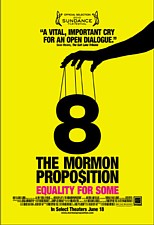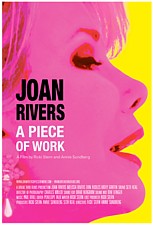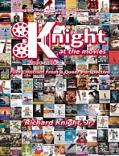
A searing behind the scenes look at the Mormon Church and a comedic icon
film from a queer perspective
Reviews
| KATM media outlets |
| KATM featured weekly |
| Join Us! |
| KATM on RT |
| Vidcast Starring KATM |
| NOTE: THIS SITE ONLY LOADS CORRECTLY WITH EXPLORER AND MOZILLA BROWSERS - SORRY SAFARI USERS! |
| Buy the KATM Book |
The Truth Hurts:
8: The Mormon Proposition-Joan Rivers: A Piece of Work
Expanded Edition of 6-16-10 WCT Knight at the Movies column
By Richard Knight, Jr.
8: The Mormon Proposition-Joan Rivers: A Piece of Work
Expanded Edition of 6-16-10 WCT Knight at the Movies column
By Richard Knight, Jr.
| “Only marriage between a man and a woman is valid or recognized in California.” That one sentence, just 14 words, is the simple extent of Proposition 8, the infamous referendum that California residents narrowly passed a year and a half ago and with one fell swoop, denied gay people their civil rights in the state. But this blemish on the history of Our People also helped to galvanize the queer movement nationally at the same time and left millions – straight and gay alike – wondering who was to blame for this stunning set back? 8: The Mormon Proposition, an intriguing new documentary produced-written and co-directed by gay filmmaker Reed Cowan (along with Steven Greenstreet), points the finger squarely at the behind the scenes culprit: The Church of the Latter Day Saints, headquartered in Utah, who, as the film posits, poured a sea of money, time, and a lot of energy (utilizing carefully rehearsed volunteers) in their hell bent quest to overturn gay marriage in their neighboring state California. The film, narrated by Dustin Lance Black, the openly gay, Oscar winning screenwriter for Milk (and ex- Mormon), describes the church’s position on gay marriage and the “gay lifestyle” (which they deem as a choice) as a holy war and offers striking evidence to make the case. If this movie – which offers a parade of ex-Mormons (most of them gay) revealing personal histories of anti-gay rhetoric and shameful abuses by the Mormon Church – is even HALF true then “holy war” is, indeed, the correct term and offers a convincing argument for the queer community to start organizing a counter- defense and pronto. These religious terrorists ain’t kiddin’ around folks. None of this will be news to the queer community but, as in Michael Moore’s Fahrenheit 9/11, seeing the behind the scenes machinations as the events slowly unfolded in a domino effect makes for a great cautionary tale. Cowan’s hard evidence for these abuses mainly comes from Fred Karger, a longtime anti-LDS activist who supplies the filmmakers with snippets of a video tape (and the complete audio) played during church services mapping out the campaign to sweep Prop 8 to victory and stacks of insider LDS documents. The film alleges that the California “Yes on 8” campaign used by the Mormons was formulated as far back as 1996 when LDS secretly partnered with the Catholic church and other conservative groups to stop same sex marriage in Hawaii. Cowan, who has paid a heavy personal price for making the film (he’s an ex-Mormon, too) then delves beyond Prop 8, digging into the Mormon’s shameful anti-gay history; its efforts to “straighten” out their recalcitrant homo brethren. We see the emotional fall out from this systematic persecution of those even perceived to be gay within the Mormon fold. Hence, the high suicide rate for gay Mormon teens (many of whom are homeless), the withdrawal of familial, financial, spiritual, and emotional support, etc., etc. But we don’t get a lot of hard data or background on those testifying on camera which after awhile begins to dilute the impact of the message. “Enough of the crying homos,” I thought at one point, “Give me more from those secret internal documents and more attempts to confront church officials over this hard evidence of anti-gay intolerance.” Not surprisingly, 8: The Mormon Proposition, doesn’t offer much in the way of an official rebuttal from church officials. There is a brief audio recording of a denial for interview requests with church officials by Kim Farah, a spokesperson for the Mormons, who basically says the church doesn’t want to get into a standoff with the queer community. We get the idea that the Mormon Church is hesitant to come out about their anti-gay bias publicly so why not, in Michael Moore fashion, keep knocking at their doors, camera crew in tow and embarrass the hell out of these guys? Instead, Cowan goes the emotional route – he lays on the scary music, gives us multiple scenes of a young gay couple weeping at the injustice of it all (along with the mother of one of the lads), and uses some other over the top theatrics to convince his audience that we’re dealing with a group that doesn’t have the best interests of the queer community at heart. But I don’t need convincing – I’m already a member of the choir. So are millions of our mainstream allies. Given the background of the filmmakers, the over the top emotionalism that at times sullies the message is more than understandable but here’s hoping, nevertheless, that uninformed filmgoers will see beyond the lopsidedness that is at times inherent in 8: The Mormon Proposition and have their eyes opened. +++++++++++++++++++++++++++++++++++++++++++++++++++++++++++++++++++++ Joan Rivers: A Piece of Work, from documentarians Ricki Stern and Annie Sundberg, is a warts and all year in the life portrait of the self-described “semi” legend who has long been beloved by the gay community. Rivers is turning 75 as the film begins and isn’t happy about that or what she perceives as the less than red hot state of her career. As daughter Melissa explains, insecurity and comedy go hand in hand. As do, apparently, constant anxiety. Long accustomed to a schedule that would give even an overachiever like Kathy Griffin a moment’s pause, much of the film follows Rivers, aided by an assistant and a couple of managers (one who goes AWOL so often it becomes a running sick joke in the film), in her quest to keep that schedule full of high priced gigs and higher profile publicity opportunities – and stay ahead of her comedic peers who laud her as a legend but who, in her mind, want her status and respect. As we get a history of Rivers' life and career highs we follow the brash comedian with the sailor’s vocabulary talking nonstop through her season long appearance on the “Celebrity Apprentice” reality show (where she eventually emerged as the winner), as she delivers meals to AIDS patients with her grandson Cooper on Thanksgiving, presiding over a specially brought in table for her guests, at the Kennedy Center honoring George Carlin, in a hole in the wall club in Jersey, and a lot of time backstage, in hotel rooms, airport lounges, and in the back of limos with her assistant, bemoaning the impact of age on her career and her looks. The result seems very much like a deluxe episode of Griffin’s reality show “My Life on the D-List” and like the first couple of seasons of the show, A Piece of Work is just as galvanizing and dishy. There are a lot of laughs, tributes from her fellow comics and those she mentored (most notably Griffin), and some surprising heartfelt revelations. “My career is an actor’s career. I play a comedian,” Rivers insists. The lukewarm reception to an autobiographical play she’s written and stars in is given the cold shoulder by London critics and we see the personal toll as she decides to cancel a transfer to Broadway. But it’s only momentary and Rivers quickly bounces back. Also revealing is the sequence devoted to her late husband Edgar Rosenberg, who managed her career but committed suicide in 1987 when it imploded following a late night talk show debacle that found her at the top of Johnny Carson’s enemies list – and for awhile, most of America’s. The conflicted feelings about Rosenberg are telling – decades later and there’s still obviously been no real closure – wrapped as it is in Rivers fall from the career heights that coincided with it. There are seemingly few, if any boundaries to keep the viewer from “the real Joan.” Stern and Sundberg don’t play up to their subject nor fawn over her and, with a minimum of fuss, record this conflicted woman in daily pursuit of her “second child,” her career. The camera gets very close to the face that has become the sick poster child for too much plastic surgery – a fact that Rivers bemoans – but again, in one revealing aside she declares, “No man has ever really called me beautiful” hinting at the real reason for all the surgeries. Anger has fueled her comedy from the beginning; earning her millions and millions of fans in the process and for her gay devoted gay following she’s a longstanding icon and a trailblazer (women, who have often been the brunt of her humor, may have more conflicted feelings about her). But at what cost to herself? We see a person who has sacrificed for decades in a quest for more of those laughs, more of those millions, more of those magazine layouts, and more of those gigs no matter how small time and in the process we are given such an overload of laughs that we are also reminded of the comedic genius of Rivers. Ironically, one wonders if Rivers, so caught up in the marketing of the product that she has made of herself, derives any pleasure from this unique gift or has given it a second thought in years. |





